Zagreb Stock Exchange Indices Slip Into Red
ZAGREB, 24 March, 2021 - The main Zagreb Stock Exchange (ZSE) indices dropped by about 0.5% on Wednesday, with the Crobex decreasing by 0.48% to 1,853.53 points and the Crobex10 slipping by 0.54% to 1,161.91 points.
Regular turnover amounted to a mere HRK 3.8 million, about 2 million less than on Tuesday, and not one stock crossed the turnover mark of one million kuna.
The highest turnover, of HRK 770,100, was generated by the Atlantic food group. The price of its shares dropped by 0.68% to close at HRK 1,470 per share.
(€1 = HRK 7.570356)
For more about business in Croatia, follow TCN's dedicated page.
Advantages of Euro Currency Significant but Economy Needs to be More Flexible
ZAGREB, 19 March, 2021 - Croatia will enter the euro area on 1 January 2023 at the earliest, and introducing the euro has a number of advantages but for those advantages to be greater the economy needs to be more flexible, including with regard to the labour market, a conference heard on Friday.
The conference, focusing on the introduction of the euro as the official currency in Croatia, was organised by the students' association Financial Club.
Croatian National Bank (HNB) Governor Boris Vujčić said in his opening remarks that Croatia cannot enter the euro zone before 1 January 2023.
"Whether Croatia will enter the euro area on 1 January 2023 or a year or two later, depends on when it will meet the nominal convergence criteria," said Vujčić, recalling that in July 2020, Croatia entered the European Exchange Rate Mechanism II (ERM II), a sort of waiting room for the euro.
He explained that the ERM II envisaged a minimum two years of participation in it so that a candidate aspiring to join the euro area can meet the nominal convergence criteria (Maastricht criteria). On the other hand, if it does not satisfy the criteria, which refer to the stability of the exchange rate, prices and interest rates, the budget deficit and the level of foreign debt, a country can remain in the ERM II indefinitely, Vujčić said.
He recalled a survey indicating that citizens fear that with the introduction of the euro the standard of living will deteriorate and prices will increase. However, surveys in countries that have already introduced the euro indicate that prices increased by 0.23 percentage points on average in the year when the euro was introduced, mostly for everyday goods such as coffee. Prices of such products are relatively lower so their increase could have been relatively high due to rounding off.
"That left the impression in public that prices increased more than they did," explained Vujčić, underscoring that the standard of living did not fall in any country that introduced the euro but rather it improved.
Ćorić: Biggest advantage to companies exporting to euro area
Minister of Economy and Sustainable Development Tomislav Ćorić said that it was clear that citizens would not start living better on the first day of introducing the euro, however, what points to better prospects was the fact that the macro environment in the euro area was free of risks that non-member countries were faced with.
The risk premium in all countries that entered the euro area has dropped, said Ćorić, noting that that was something that in normal circumstances should bring benefits to Croatia, such as reducing yields on long-term security instruments and lower interest rates on commercial and consumer loans.
Considering, however, that we live in "fairly radical economic times," and a period of very low interest rates, the effects which countries that entered the euro area some ten years ago had would be somewhat lower, however, they would still be significant, he said.
The advantages are potentially biggest for export-oriented companies considering that the exchange rate risk will be eliminated, he said.
Ćorić said that the project for euro introduction was not an end in itself but was primarily a very good tool for Croatia's long-term economic growth and development.
Mačkić: Flexibility of labour market, final goods and services market
President Zoran Milanovic's economic adviser, Velibor Mačkić, conveyed the president's message saying that it was necessary to discuss the benefits and potential harm of Croatia joining the euro area.
Mačkić believes that Croatia has not developed its own institutions sufficiently and that that poses a problem. "The country needs a different economy, a much more flexible economy, to be able to benefit more significantly from the monetary union," said Mačkić.
He added that the labour market and the market of final products and services need to be more flexible.
Mačkić underlined the importance of an efficient fiscal policy and of the reform of the tax system which Mačkić believes needs to change from "a consumption-based to income-based tax system."
For more about business in Croatia, follow TCN's dedicated page.
Zagreb Stock Exchange: Indices Fall For Second Day Amid Weak Trading
ZAGREB, 17 March, 2021 - The main Zagreb Stock Exchange indices slipped on Wednesday by about 0.7%, falling for the second straight day amid a poor trading day of just over HRK 3 million.
The Crobex fell by 0.73% to 1,863 points and the Crobex10 fell by 0.68% to 1,172 points. Both indices dropped for the second day running.
All sector indices dropped too with the construction index falling the most by 5.93%.
Regular turnover was a mere HRK 3.3 million or 2.2 million less than a day earlier.
Not one stock crossed the million kuna mark.
The highest turnover of HRK 676,000 was generated by the HT telecommunications company with the price of its shares plunging by 1.79% to close at HRK 192.50.
(€1 = HRK 7.6)
For more about business in Croatia, follow TCN's dedicated page.
Croatia Receives Second €510m Tranche From SURE
ZAGREB, 16 March, 2021 - The European Commission on Tuesday disbursed €9 billion to seven EU member states, including €510 million to Croatia, in the fifth instalment of financial support to preserve employment during the coronavirus pandemic under the SURE instrument.
This is the second instalment this year. Czechia has received €1 billion, Spain €2.87 billion, Italy €3.87 billion, Lithuania €302 million, Malta €123 million and Slovakia €330 million.
So far, 16 member states have received a total of €62.5 billion under the SURE instrument in loans which the Commission is taking out on financial markets at the best terms.
Croatia received the first instalment of €510 million on 17 November.
For more about business in Croatia, follow TCN's dedicated page.
Croatian Chamber of Trades and Crafts (HOK): "National Recovery and Resilience Plan Should Include Trades"
ZAGREB, 16 March, 2021 - The Croatian Chamber of Trades and Crafts (HOK) on Tuesday said that the National Recovery and Resilience Plan should include trades and crafts.
HOK said that a survey of 1,722 HOK members indicates a huge interest in EU grants.
Most of them (85%) consider investing in tangible and non-tangible assets to be the most important, notably purchasing equipment and machinery, and upgrading and building new production capacities.
The estimated value of projects that would be submitted by the majority of trades ranges from HRK 150,000 to 750,000, HOK said, adding that trades are willing to invest their own funds too.
HOK in particular noted that more than 73% of trades do not plan to use financial instruments in the coming period.
HOK is investing significant effort in preparing programme documentation for the 2021-2027 EU financial period.
The aim is to raise awareness of the needs of trades and that adequate calls for applications for grants are ensured.
HOK said that the needs of trades should be recognised through the National Recovery and Resilience Plan due to the consequences of the COVID pandemic and the negative economic trends. Hence HOK has sent its recommendations to Prime Minister Andrej Plenković in an effort to find the best possible solution for trades.
For more about business in Croatia, follow TCN's dedicated page.
Zagreb Stock Exchange Indices Drop Amid Slightly Higher Turnover
ZAGREB, 5 March, 2021 - The main Zagreb Stock Exchange (ZSE) indices fell on Friday amid a slightly higher turnover than the previous day, with the Crobex dropping by 0.85% to 1,829 and the Crobex10 by 0.52% to 1,139.
Week-on-week, the Crobex slid by 0.2%, while the Crobex10 increased by 0.63%.
All sectoral indices finished the day in the red, with the tourism index showing the biggest decline, of 1.35%.
Today's regular turnover was HRK 5.7 million, or HRK 1.7 million more than on Thursday.
The stock of the HT telecommunications company was the only one to cross the one million kuna mark, and it generated a turnover of slightly more than HRK 2 million. Its price went up by 1.1% to HRK 183 per share.
The company today said that a meeting of the Supervisory Board would be held on Tuesday, 9 March, when annual financial reports and the proposal for the use of profit for 2020 would be determined, and on Wednesday the revised financial reports the proposal for the use of profit would be published.
The stock of the Valamar Riviera tourism company turned over HRK 773,000, its price dropping by 2.62% to HRK 29.7 per share.
Thirty-eight stocks traded today, with 10 of them registering share price increases, 22 recording price decreases and sixremaining stable in price.
(€1 = 7.576668)
Faculty of Economics University of Zagreb Celebrates 100 Years
ZAGREB December 5, 2020 – With over 9000 students currently enrolled, the Faculty of Economics University of Zagreb is the largest faculty in Croatia. In 2020, this internationally renowned institution celebrates its 100th birthday, so TCN decided to take a closer look.
Every other student you meet in Croatia seems to study economy. It makes you wonder where they all go to after their studies are complete. Are there really so many positions for economists in Croatia?
In 2020, the Faculty of Economics University of Zagreb celebrates its 100th birthday. The long list of its famous former students gives a clue to where all the Croatian economists go – the tourism sector, diplomacy and international relations, business, politics and government.
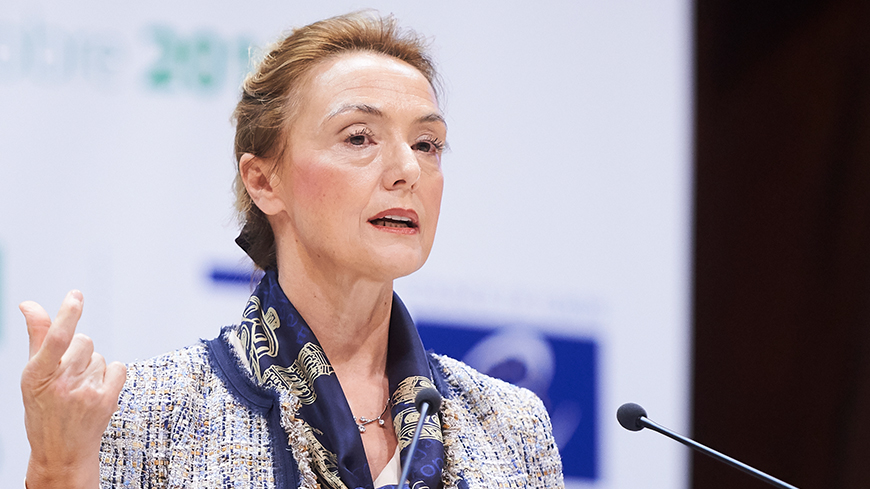 Marija Pejčinović Burić, a graduate of the Faculty of Economics of the University of Zagreb and the current Secretary General of the Council of Europe. After graduating, like Savka Dabčević-Kučar, she became o doctor of economics and before taking her current position served as Croatia's Deputy Prime Minister and Minister of Foreign and European Affairs © Council of Europe
Marija Pejčinović Burić, a graduate of the Faculty of Economics of the University of Zagreb and the current Secretary General of the Council of Europe. After graduating, like Savka Dabčević-Kučar, she became o doctor of economics and before taking her current position served as Croatia's Deputy Prime Minister and Minister of Foreign and European Affairs © Council of Europe
Graduates of the Faculty of Economics University of Zagreb have served as mayors of Zagreb and Split, Deputy Prime Minister of Croatia, Minister of Finance, Minister of the Economy, Secretary-General of the Council of Europe, Governers of the Croatian National Bank, Vice-President of the UN World Food Council, President of the Croatian Football Association, Minister of Environmental and Nature Protection, special advisors to the President of Croatia and countless university professors, including several former rectors of the University of Zagreb. Within its graduate professors, it has produced no less than 19 full members of the prestigious Croatian Academy of Sciences and Arts, more than any other single institution in the country.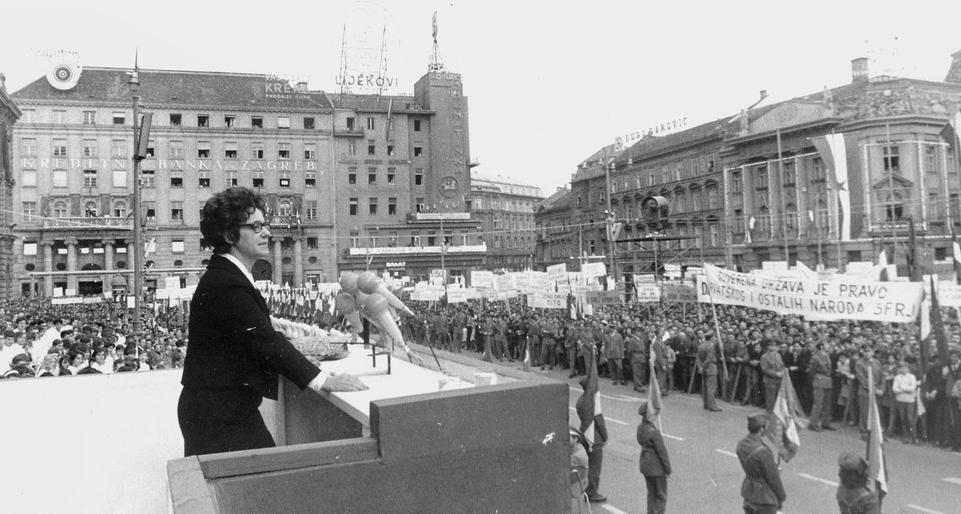 Savka Dabčević-Kučar, a graduate of the Faculty of Economics of the University of Zagreb. Born on Korčula, she became an anti-fascist in World War II, joining the partisans after her brother was beaten by fascists. After graduating, she continued to study at the faculty and became one of the first doctors of economics in Croatia, raising eyebrows by choosing to write her doctorate dissertation about a non-Marxist economic theorist (Englishman John Maynard Keynes). She became a professor at the faculty in the 1950s and despite her great advances in political life, remained a committed teacher at the faculty until 1971. In 1967, she was elected President of the Socialist Republic of Croatia. In 1969, she moved to an even more important position - that of president of the Central Committee of the League of Communists of Croatia. She was the first woman in Europe to be appointed head of government of a political entity and the first female in Croatia to hold an office equivalent to a head of government. In this picture, she addressed supporters on Ban Jelacic Square Zagreb during the movement called the Croatian Spring, which called for greater autonomy for Croatia. At the address, thousands cheered her as “Savka, queen of the Croats”. For her pivotal role in the movement, she was removed from her positions and public life and retired. She returned to politics in 1990 upon the collapse of communism in Europe and during the Croatian war of independence was one of the few politicians who visited the front lines of battle in Slavonia, Petrinja, Pokupski and the Dalmatian hinterland
Savka Dabčević-Kučar, a graduate of the Faculty of Economics of the University of Zagreb. Born on Korčula, she became an anti-fascist in World War II, joining the partisans after her brother was beaten by fascists. After graduating, she continued to study at the faculty and became one of the first doctors of economics in Croatia, raising eyebrows by choosing to write her doctorate dissertation about a non-Marxist economic theorist (Englishman John Maynard Keynes). She became a professor at the faculty in the 1950s and despite her great advances in political life, remained a committed teacher at the faculty until 1971. In 1967, she was elected President of the Socialist Republic of Croatia. In 1969, she moved to an even more important position - that of president of the Central Committee of the League of Communists of Croatia. She was the first woman in Europe to be appointed head of government of a political entity and the first female in Croatia to hold an office equivalent to a head of government. In this picture, she addressed supporters on Ban Jelacic Square Zagreb during the movement called the Croatian Spring, which called for greater autonomy for Croatia. At the address, thousands cheered her as “Savka, queen of the Croats”. For her pivotal role in the movement, she was removed from her positions and public life and retired. She returned to politics in 1990 upon the collapse of communism in Europe and during the Croatian war of independence was one of the few politicians who visited the front lines of battle in Slavonia, Petrinja, Pokupski and the Dalmatian hinterland
The Faculty of Economics University of Zagreb is the largest faculty in the country. Over its 100 year history, it has established itself as an internationally respected institution. Today, it has around 9000 persons enrolled, caters for international students with some courses in English and has produced over 86, 000 graduates, including 856 doctors of science.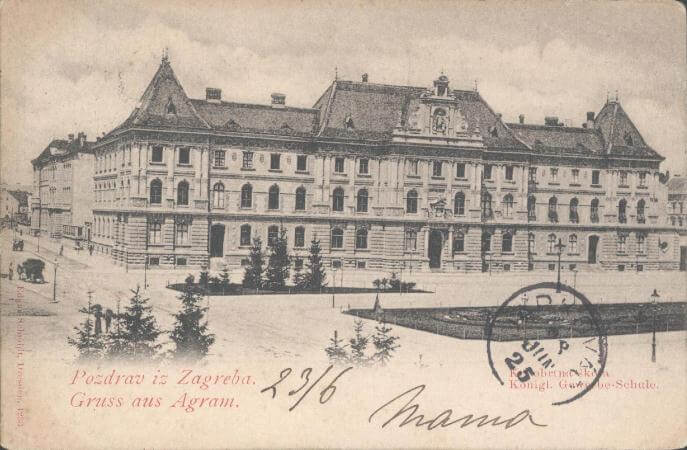 In its infancy, students of the College of Trade and Transport were taught at the Technical College, which is today the Museum of Arts and Crafts in Zagreb © National and University Library in Zagreb
In its infancy, students of the College of Trade and Transport were taught at the Technical College, which is today the Museum of Arts and Crafts in Zagreb © National and University Library in Zagreb
The history of the Faculty of Economics University of Zagreb starts with the opening in 1920 of its forerunner, the Zagreb College of Trade and Transport. Its purpose was to educate in the areas of banking, domestic and international trade, transport, consular services, insurance and the education of teachers. Its courses lasted three years and it proved so popular that in the academic year 1923/24, some 1,125 students were enrolled.
The institution held college status until 1925 when Stjepan Radić became the Minister of Education. It must have been unusual for Radić to find himself as part of the government of the Kingdom of Serbs, Croats and Slovenes, the state which preceded the Kingdom of Yugoslavia. Today, Radić is best remembered as a politician outspoken in his advocacy of autonomy for Croatia. Before his appointment to the government, he had always done so in opposition. Indeed, he had been imprisoned several times for his views, which were proclaimed loudly in his writings or in person (he was a gifted public speaker). As recently as March 1925 he had been in prison but, when the political party of which he was a member officially recognised the monarchy and the state constitution, he was freed. In a remarkable turnaround, before the year's end, he was a minister in the government.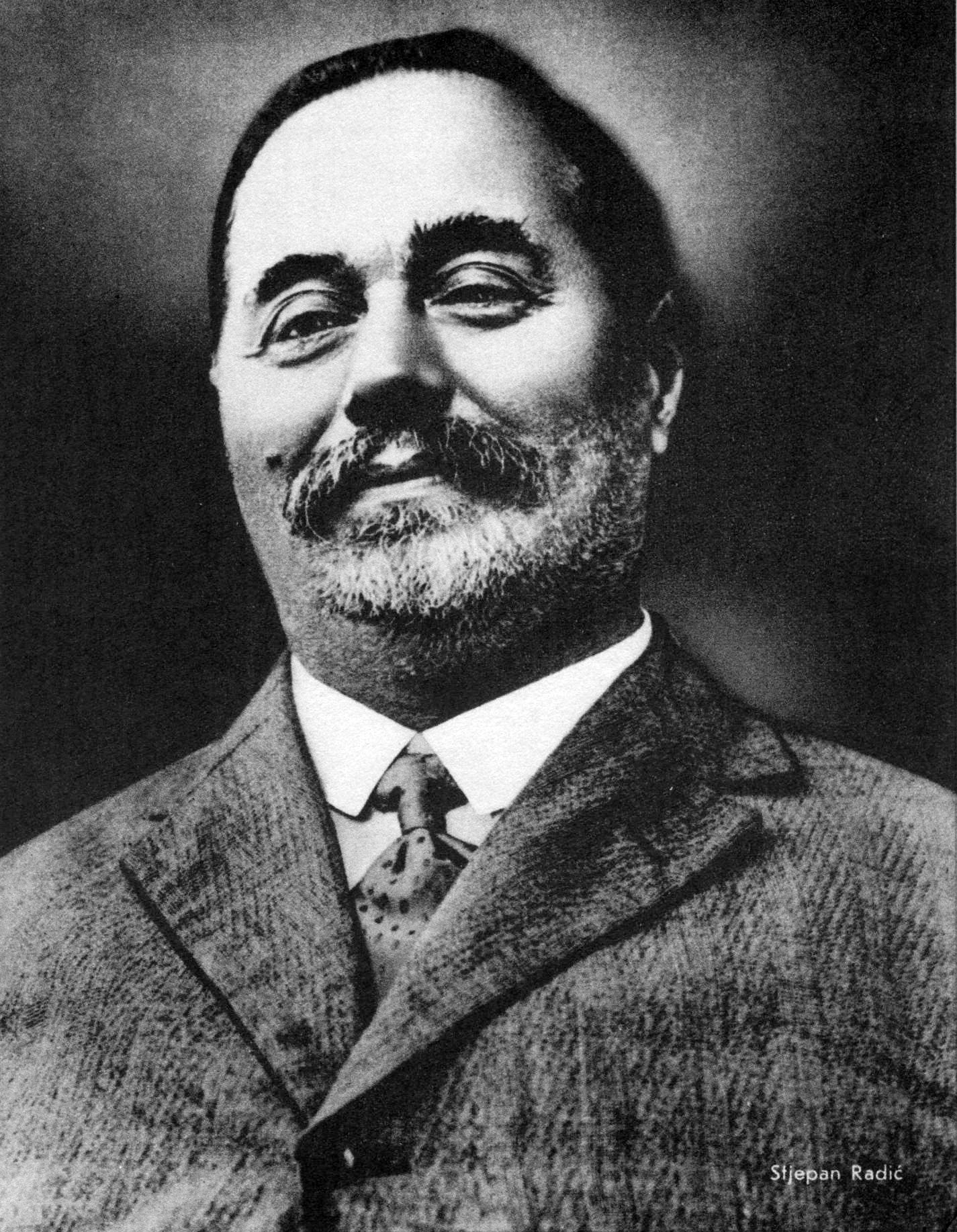 Stjepan Radić, pictured in the 1920s © public domain. In 1895 Radić was sent to prison for the public burning of the Hungarian flag in Zagreb – alongside Antun Dabčević, the father of Savka Dabčević-Kučar.
Stjepan Radić, pictured in the 1920s © public domain. In 1895 Radić was sent to prison for the public burning of the Hungarian flag in Zagreb – alongside Antun Dabčević, the father of Savka Dabčević-Kučar.
Stjepan Radić's desire for Croatian autonomy was not born from the ideals of the political class of Zagreb. The ninth of eleven children, born to a peasant family in a small village on the banks of the Sava river, just north of Sisak, Radić was very much a representative of the people whence he came. To him (and others in his family – his brother and nephew also being prominent politicians), education had the most important role to play in emancipation. He had lived in poverty in order to complete his own - after being banned from university-level educational institutions throughout the whole of the Austro-Hungarian empire for his protests against the state, he travelled penniless to Russia, France and Switzerland to complete his studies. In the latter, finance was one of his chosen subjects.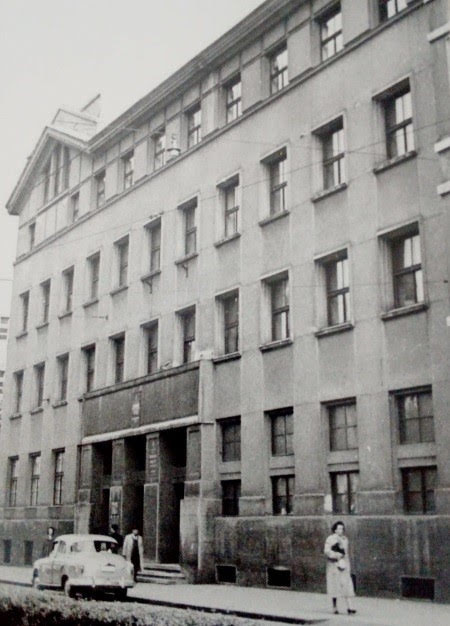 The first dedicated building of the Higher School of Economics and Commerce was located on the corner of Bauerova and Zvonirmirova © Faculty of Economics University of Zagreb
The first dedicated building of the Higher School of Economics and Commerce was located on the corner of Bauerova and Zvonirmirova © Faculty of Economics University of Zagreb
Under Radić's spell in office, the Zagreb College of Trade and Transport became the Higher School of Economics and Commerce. Its courses extended to four years, it attained university status. With no building designated to the increasingly popular institution, students had sometimes been taught at the Technical College (today's Museum of Arts and Crafts) and in parts of what is now the Mimara Museum. A dedicated home for the faculty was authorised and its construction started in 1927. Classes began at the faculty, located on the corner of Bauerova and Zvonimirova, in 1928, but within the decade the institution had outgrown its home and a plot of land in Svetice was acquired in order to build a new, larger facility. Its construction was interrupted by the Second World War and students would end up being taught on the Bauerova and Zvonimirova site all the way up to 1952.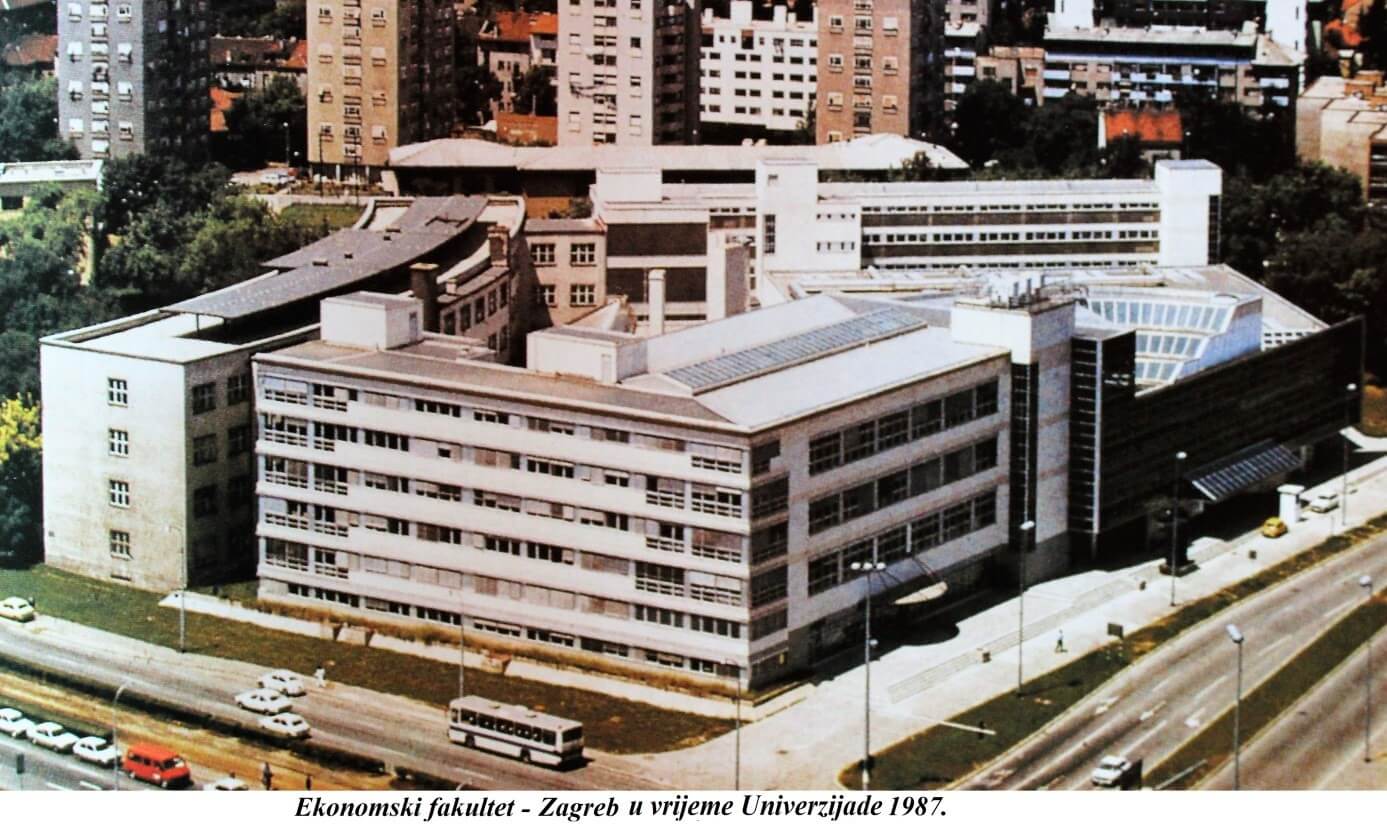 The faculty's modern building, pictured in 1987. Today, the faculty has 17 departments - Finance, Demography, Economic Theory, Business Economics, Informatics, Macroeconomics and Economic Development, Marketing, Mathematics, International Economics, Business in Foreign Languages, Organization and Management, Law, Accounting, Statistics, Trade and International Business, Tourism, Physical Education and Health © Faculty of Economics University of Zagreb
The faculty's modern building, pictured in 1987. Today, the faculty has 17 departments - Finance, Demography, Economic Theory, Business Economics, Informatics, Macroeconomics and Economic Development, Marketing, Mathematics, International Economics, Business in Foreign Languages, Organization and Management, Law, Accounting, Statistics, Trade and International Business, Tourism, Physical Education and Health © Faculty of Economics University of Zagreb
In 1947, the Higher School of Economics and Commerce became the Faculty of Economics University of Zagreb. In 1952, the faculty officially moved to the new site in Svetice. In 1968 it expanded once more when it merged with the 12-year-old College of Economics. Since then, the building at Svetice has received major upgrades and further facilities of the faculty can now also be found at the university campus in Borongaj, in Varaždin, in Koprivnica and in Bjelovar. After a century of existence, the Faculty of Economics University of Zagreb's longstanding difficulties to meet the popularity of its courses with the space available are now over. Not only can they accommodate every Croatian economy student who makes the grade, but they are also able to offer places to some of the best international students. It would surely come as no surprise if they are still educating the future elites of business, banking, finance and politics in another 100 years.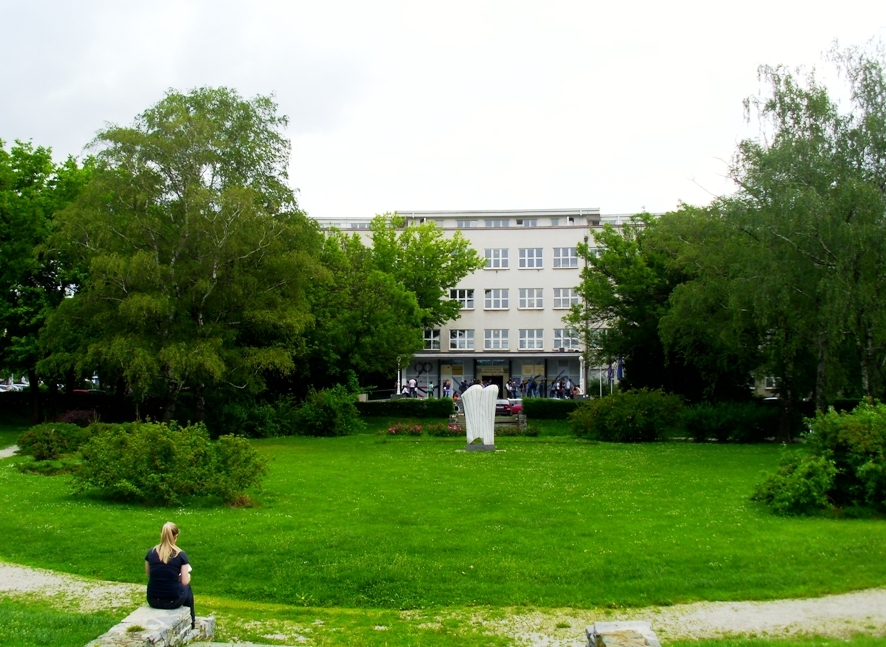
The Faculty of Economics University of Zagreb site in Svetice, as seen from its garden © Wolf - Pidgeon
FinMin: Almost Entire Amount of This Year's Financing Needs Secured
ZAGREB, July 30, 2020 - Finance Minister Zdravko Maric said on Thursday that of the HRK 63.4 billion necessary for financing this year, almost all had been secured by the summer break.
Although the financing account of HRK 63.4 billion sounded really high and there was a polemic about how to secure the money, almost all have been secured by the summer break, he said in parliament.
A general government surplus was planned for the first time for this year, in the amount of HRK 1.5 billion, but the coronavirus epidemic caused a drop in revenues and an increase in expenditures for healthcare and to help the economy, due to which the state had to borrow on the domestic and the foreign market, Maric said.
Instead of a surplus, we are planning a deficit of almost HRK 25 billion and this has affected the financing account, which amounts to HRK 63.4 billion for 2020, he added.
Maric announced that macroeconomic projections would be revised in late August and early September.
He was speaking during a debate on the ratification of three loan agreements with international financial institutions totalling almost €660 million for dealing with the COVID-19 crisis, the reconstruction of the Zagreb area after a March earthquake, and boosting public healthcare.
Two of the agreements are with the World Bank and one with the Council of Europe Development Bank.
(€1 = HRK 7.5)
Young Entrepreneurs Created a Website to Provide Finance Advice to Students
July 27, 2020 – The new website called Dorean Society is led by three young Croatian economic enthusiasts, Dorian Antešić, Filipa Topčić and Teodora Raguž from Faculty of Business and Economics in Rijeka. They aim to create a comprehensive place of courses, career topics, recommendations, reviews, and all information needed for Business and Economics students to have a successful career.
The website is completely in English because they plan to create a community of Business and Economics students worldwide. Also, they want to publish articles by international students, business people, and professors.
Therefore, as founder Dorian Antešić says, “students can have a look in the opportunities that lay all around the globe”.
Knowledge for today and tomorrow
At first, it was only Antešić who had this idea of helping other students, but soon he recruited his colleagues Filipa Topčić and Teodora Raguž from Faculty of Business and Economics in Rijeka to start working on the website.
The Student Council of the University in Rijeka helped them financially with, as Antešić calls it, the “seed” money.

Source: Pixabay
For now, they are researching general topics of needed skills for Business and Economics students, but their long-term plan is to do broader research, get involved in international projects, and even collaborate with universities and businesses.
“We are researching what these students need to know now and what they will need to know in the future,” says Antešić.
Lack of students’ interest
What made Antešić create a helpful website for students is the lack of motivation for studying Business and Economics. As he explains, a lot of them applied to these fields because they weren’t sure what to study and it made them very passive.
Just like a lot of other students in Croatia from different study fields, they are lost, they don’t know what to do after they graduate and “they aren’t very informed about their career options or development of their field in present and where it is going,” says Antešić.
Source: Pixabay
“Considering that Business and Economics students make up the biggest percentage of students, I think this needs to change. This high percentage of students who are lost, passive and unmotivated about their studies can be transformed into proactive students, who are willing to learn as much as possible about their studies, research what their interests might be, maybe even start their own company while they are studying,” Antešić points out.
Ambitious goals
On the other side, Antešić has been interested in finance, his field of study, for a long time. He was not like other students described above.
“Since the beginning of my university years, I was active in international organizations, writing, and leading projects. I knew what interests me in business, what I want to become (entrepreneur), and why,” Antešić confidently says.
The effort to share his motivation with other students by helping them seems very ambitious. Nonetheless, the Dorean Society’s efforts are directed to the schools and faculties too.
“We want to research what Business and Economics schools can do to give more value to students, how to make them more active on a class or other activities, and how to prepare for the present and future needs of the market and society overall,” explains Antešić.

Dorian Antešić, founder of the Dorean Society website / Source: Private archive
“My belief is also that improved financial knowledge makes people less manipulated by politicians and they become more active in civic life. They know the connection between what they pay in taxes and what service they get for that money. This is a huge problem in Croatia since people think that we have ‘free’ services like healthcare, education, pension. These services cost a lot of money and the benefit we get in return is not appropriate,” Antešić thinks.
The importance of financial literacy
Even though the website is intended for students of Business and Economics, other students can also find it interesting as the content will be of use to everyone.
“We will talk about skills that are useful to every student and every person in general, like financial management. They will have the opportunity to learn more about personal finances, how to earn more money, how to spend it efficiently, save it and invest,” explains Antešić.
One of their objectives is the increase in financial literacy among people, especially young people. Antešić considers financial literacy important for every person because everyone is dealing with money daily.
“Financial literacy is the ability to understand and effectively apply various financial skills, including personal financial management, budgeting, and investing. It helps individuals make better long-term life decisions and makes them financially sustainable,” explains Antešić, adding that people need to know how to manage money more efficiently.
Source: Pixabay
Privredna Banka Zagreb's Dinko Lucić Wins Prestigious Award
As Poslovni Dnevnik writes on the 25th of May, 2019, Dinko Lucić, CEO of Privredna banka Zagreb (PBZ), which is a member of the Intesa Sanpaolo Group, is the winner of the prestigious CEO Today's Europe Awards for 2019 for his remarkable contribution to the presentation of Privredna banka Zagreb in the Republic of Croatia.
Every year, CEO Today recognises and honours the most prestigious companies and their C-level executives in today's business world. The CEO Today's Europe Awards rewards the success, innovation and strategic vision of CEO's in numerous sectors and industries across Europe (the IT sector, telecommunications, pharmaceuticals, banking and finance, energy, mobile technology and communications, transportation services, etc.). CEO Today identifies the most successful, innovative, and future-oriented company leaders.
On the occasion of the announcement, Dinko Lucić, the CEO of PBZ, stated:
"I'm extremely proud of this truly special award, which is a historical and permanent record of recognition and success of our entire PBZ Group team. One of my basic beliefs, which has been confirmed during my long-standing managerial practice, is that the real difference is the people. I'm proud of our team and on this occasion, I'd like to thank all of our employees and also all of our clients for their constant efforts to be even better and to provide the full spectrum of financial services at the highest global level.''
The CEO Today Europe team has recognised a number of achievements by Mr. Lucić and PBZ in the past twelve months. The research team looks at the attitudes of many stakeholders, including investors, analysts, employees and media professionals around the world in order to properly create the basis for their annual award.
The results are then used as guidelines for considering and publishing the best management practices and critical performance factors, as well as the determination of eligibility based on achievements, which can be revenue growth and/or profit, a successful turnaround, good performance in difficult and complex times for the economy and industry, expanding onto new markets, leading market share(s), successful M&A integration, new products and services, and new business models and strategies.
Make sure to follow our dedicated business pages for much more.


